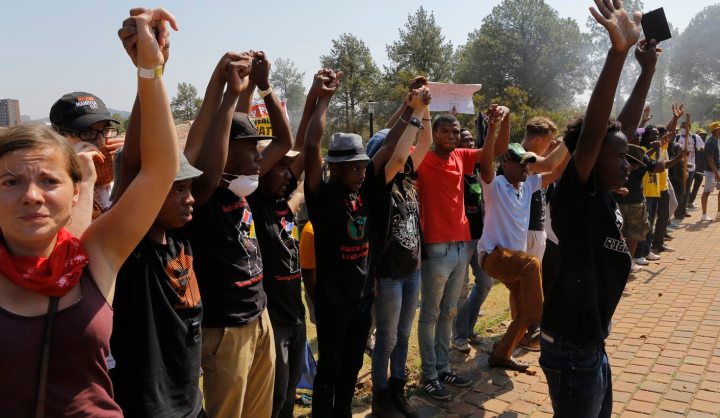South Africa
#FeesMustFall: Varsities still closed amid confusion over the next move

Days after President Jacob Zuma announced a freeze on university fee increases for 2016, students at many universities across the country continued their protests on Monday. Over the weekend, students met discuss what to do following the president's announcement. Many decided to use the momentum of the campaign against fees to push for further reforms. Consensus, however, is getting harder to reach. By GREG NICOLSON.
The University of Witwatersrand remains closed on Monday after students on Sunday confirmed a decision to continue shut down of all campuses. Before a closed meeting on Sunday, some students spoke among themselves about wanting to allow the university to open so they could write their exams and put other demands on hold.
The student protests started at Wits almost two weeks ago and have since spread to campuses across the country. On Monday morning at 10:00 Wits students will again meet to discuss the path forward. At multiple mass meetings this weekend they decided to continue the fight towards free education, an end to outsourcing of staff, and for clarity on the financial relief offered to students. On social media, however, there has been disagreement over whether to continue protesting or sit for exams, with party politics playing a role; one student on Monday said the morning’s meeting was to ensure students fully supported ongoing action.
Vice Chancellor Adam Habib said he was disappointed by the decision to continue protesting. “We are disappointed at their decision, as we feel that it will put in jeopardy the academic futures of many students who will not be able to pass or graduate. This will only further entrench and deepen the inequalities in our society,” he said. The university’s senate will meet on Monday to discuss the protests and Habib said Wits is investigating outsourcing issues, which students have been raising for years.
At University of Pretoria classes were set to resume on Monday according to Vice Chancellor Cheryl de la Ray. She told students that, provided they act responsibly, the university will not institute disciplinary charges from the protest. Students however decided to continue demonstrating and on Monday morning a group of them gathered to occupy parts of the university.
Management at the Tshwane University of Technology had also said the university would resume normal activities on Monday, but students began gathering to protest again in the morning. “Although we understand the reasons for students protesting, the continuation of the academic programme and the success of our students are of central importance and we urge students not to disrupt the academic programme. The university will implement an academic recovery programme to make up for the time lost last week, which will be announced as soon as possible,” said Vice Chancellor Lourens van Staden. The university’s SRC also called for classes to resume.
Regarding the seven people arrested after Friday’s demonstration in Pretoria, the Socio-Economic Rights Institute (SERI) said the six students and one informal trader were finally released on Sunday. Nomzamo Zondo, SERI’s director of litigation said, “We are pleased that we were able to secure the release of our clients – six of whom were exercising their constitutional right to protest, and one of whom was a mere bystander. We remain gravely concerned both at the heavy-handed tactics adopted by the public order police and the extended, and totally unjustified, detention of our clients after their arrest.”
Late on Sunday night, University of Cape Town Vice Chancellor Max Price issued a statement explaining that the campus will be closed until Friday and exams postponed. While saluting the national student movement, Price noted the uncertainties for universities, particularly after the funding emergency of 2016.
“At UCT we will need to review our budgets and funding priorities for next year, with an eye on additional cost we will have to carry. But UCT along with all universities cannot carry the costs of the new fees dispensation without significant further financial investment from the state,” said Price. Regarding staff outsourcing, one of the biggest issues for students, the vice chancellor said it stands in the way of resuming university activities and management will investigate how to promote insourcing.
The University of Free State said it would resume classes on Monday and push back exams a week to 2 November. Last week, University of Western Cape Vice Chancellor Tyrone Pretorius said it would open on Monday with the support of the SRC. But at the university, where students faced off with police last week, some students were reportedly gathering on Monday morning.
According to a statement from Rhodes University, the academic programme will continue after students and management reached an agreement on fees, avoiding discrimination of students and committing not to financially exclude students.
On Monday morning, the South African Students Congress issued a statement calling for “a go-slow on the national shutdown”:
“It should also be noted that whilst the fee increment question has been secured, the various campus specific questions we have been struggling for are also in existence. This is why it is important for our structures to not be lost in celebration and miss an opportunity to engage these questions that will affect registration next year,” said the Sasco NEC. “We appeal to all our structures to continue to struggle for their aims without being captured by forces of reaction that are hell-bent at weakening the student movement and totally collapsing our universities.”
As Sasco suggests, reaching a consensus among students appears to be a difficult task. The situation is fluid and no-one really knows what the near future will bring. DM
Photo: Some of the protesting students and youths from political parties gather at the Union Buildings, during another day of demonstrations against fee increases at universities, in Pretoria, South Africa, 23 October 2015. EPA/KIM LUDBROOK

















 Become an Insider
Become an Insider